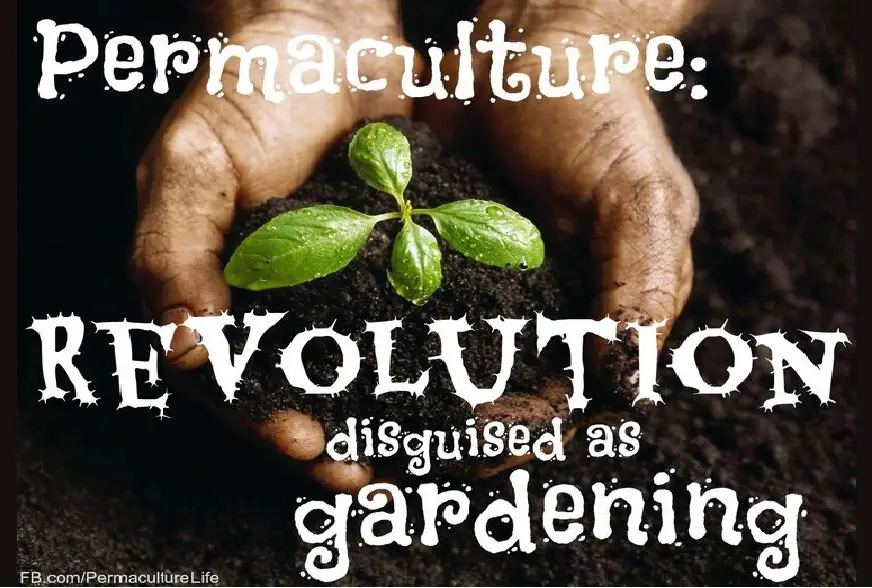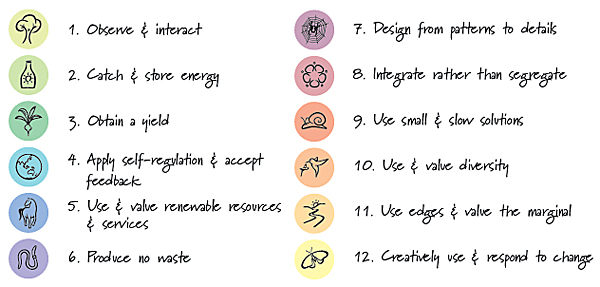By Tim Bryant
Guest writer for Wake Up World
One of the focuses of both The Last American Vagabond and Wake Up World has been to not only properly diagnose all the problems facing humanity at this current juncture, which undoubtedly is important, but also to evolve past that by discussing solutions to these problems. In the end, what’s the point of understanding all these problems if the alternative community is not going to step up to the plate and do something about it.
One of those real-life solutions that is incredibly powerful and totally plausible is permaculture. Originally rooting itself in the idea of “permanent agriculture”, the basic premise of permaculture is to build sustainable life systems — whether it’s food and water cultivation, community development, or technological implementation — that work within the natural laws of the universe, as opposed to systems that only benefit humanity, yet harm natural ecological systems.
As the founder of permaculture, Bill Mollison, once said: “Permaculture is a design system for creating sustainable human environments… [It involves] the conscious design and maintenance of agriculturally productive ecosystems, which have the diversity, stability and resilience of natural ecosystems.”
Before getting more into the actual practice, it’s important to understand the three basic ethics of permaculture:
1. Care of the Earth: This includes all living and non-living things — plants, animals, land, water and air.
2. Care of People: This promotes self-reliance and community responsibility. After all, access to resources is necessary for existence.
3. Setting Limits: This means limiting consumption, and giving away surplus — ie. contributing surplus time, labor, money, information, and energy to achieve the aims of self-sufficiency, and Earth and people care.
In reality, this is only scratching the surface, as permaculture involves a plethora of knowledge, ideas, and practices that can take some time to fully comprehend and implement. Yet, despite the initial learning curve, permaculture has the profound ability to transform the world. Therefore it is crucial that all serious activists and environmentalists start to comprehend the subject. We won’t change anything in our society if we can’t first sustain ourselves, through a proper understanding of the environment on which we depend, and by collaborating with our environment on its own terms.
“Though the problems of the world are increasingly complex, the solutions remain embarrassingly simple.” ~ Bill Mollison
To accelerate the learning curve of those of us who are still unfamiliar with permaculture, we brought in the expertise of Eric McCool (pictured). Eric is an activist, permaculture enthusiast and founder of the Permagora website, which stems from the idea of merging permaculture with agorism. (Agorism is a philosophy of peaceful revolution that advocates for a society based on voluntary participation in what is currently consider ‘counter-economics’, ie. non-aggressive activities that are forbidden by the state, such as the “Black Market” or “underground economy.”)
In this video, we not only go deeper into the discussion of what permaculture is, we also discuss its paramount importance when it comes to activism and building new systems that can support humanity without being detrimental to our natural world. This combination of working within the natural laws of the universe and practicing agorism, seems to have incredible potential — if it can get the manpower behind it. I do hope you take the time to check out the video below, as well as Eric’s website, because he is a human being that not only has a wealth of knowledge but is extremely passionate about what he does.
Note: For those interested in taking the next step toward self-sustainability, there is complete list of resources listed below plus a video presentation by Geoff Lawton, “The Permaculture Designers’ Manual in One Hour”. These resources should set a solid foundation for anyone looking to not only understand the idea, but to also get involved in permaculture at a direct level.
An Introduction to Permaculture and Its Symbiotic Relationship with Agorism
Geoff Lawton: The Permaculture Designers’ Manual in One Hour
Permaculture Resources
Eric’s McCool’s website, ‘Permagora’:
Recommended Books:
- Bill Mollison: Permaculture: A Designer’s Manual (revised 2nd edition)
- David Holmgren: Permaculture: Principles and Pathways Beyond Sustainability
- Toby Hemenway: Gaia’s Garden: A Guide to Home-Scale Permaculture (2nd edition)
- Sepp Holzer: Permaculture: A Practical Guide to Small-Scale, Integrative Farming and Gardening
- Masanobu Fukuoka and Larry Korn: The One-Straw Revolution: An Introduction to Natural Farming
- Wolf D. Storl: Culture and Horticulture: The Classic Guide to Biodynamic and Organic Gardening
Magazine Publications:
Videos, Films:
From permaculture pioneer Geoff Lawton:
- Introduction to Permaculture Design (2009)
- Harvesting Water the Permaculture Way (2007)
- Greening The Desert II (2009)
- Permaculture Soils (2010)
- Urban Permaculture (2011)
- Permaculture: Geoff Lawton at TEDxAjman (Ted Talk, 2012)
- and many more…
From others:
- Bill Mollison: The Permaculture Show: A Permaculture Design Course (presented in 16 in-depth parts)
- Patrick Whitefield: Introduction to Permaculture
- Andrew Millison: Permaculture Conversations (with Willi Paul)
- Toby Hemenway: Redesigning Civilization
Websites:
- Introduction to Permaculture: www.permaculture.net/about/brief_introduction.html
- Permaculture Association (UK): www.permaculture.org.uk/education/introduction-permaculture
- Permaculture principles.com: www.permacultureprinciples.com
- Permaculture Institute: www.permaculture.org
- Common sense homesteading: www.commonsensehome.com/introduction-permaculture
- ATTRA Sustainable Agriculture Program Introduction: www.attra.ncat.org/attra-pub/viewhtml.php?id=298
- ATTRA Sustainable Agriculture: www.attra.ncat.org/attra-pub/summaries/summary.php?pub=298
Related reading on Wake Up World:
- How To Commit Nutritional Anarchy! Resistance Through Food Self-Sufficiency
- Enterprising Community Aims for Total Food Self-Sufficiency with Free Edible Landscapes
- Permaculture – Reconnect with Nature, Supply Your Own Resources
- Inhabit: Groundbreaking New Documentary Offers Real Solutions for Our Food Security and Environmental Troubles
About the author:
An avid free-thinker, Tim has set out on a mission in search of the truth in whatever form it may come. Ever since his awakening several years ago, his passion for knowledge and justice has led him on a journey into deep research, cultural travel, and complete expansion of the mind. Tim feels as if the information freely flowing into the hands of the public, due to the dawn of the Internet, cannot be stopped at this point, so he has made it his goal to help facilitate and breakdown this complex stream of information, so that others can accelerate their own awakening and be part of the inevitable change happening in society.
You can connect with Tim at:
- Website: TheLastAmericanVagabond.com
- Facebook: Facebook.com/TheLastAmericanVagabond
Recommended reading by Tim Bryant:
- Vote Nobody for President: Lead Yourself in 2016
- Understanding the New World Order – The Who, What, How and Why
- Activism: Starve the Beast, Feed the Light
- If We Are Going to Take Down the Establishment, Progressives, Libertarians, Anarchists and Non-Voters Need to Unite
- The Hidden Truths of Africa – Neocolonialism and the Modern Age of Slavery
- 5 Solutions for a New World
- What’s Really Going On Under the Hood of the Cannabis Movement: “Big Marijuana”, GMOs and Hemp
- Introduction to the Growing Earth Theory
- The Coming Revolution — A New Vibrational Reality
- Anarcho-Capitalism: The Philosophical Structure for a New Society?

If you've ever found value in our articles, we'd greatly appreciate your support by purchasing Mindful Meditation Techniques for Kids - A Practical Guide for Adults to Empower Kids with the Gift of Inner Peace and Resilience for Life.
In the spirit of mindfulness, we encourage you to choose the paperback version. Delve into its pages away from screen glare and notifications, allowing yourself to fully immerse in the transformative practices within. The physical book enriches the learning process and serves as a tangible commitment to mindfulness, easily shared among family and friends.
Over the past few years, Wake Up World has faced significant online censorship, impacting our financial ability to stay online. Instead of soliciting donations, we're exploring win-win solutions with our readers to remain financially viable. Moving into book publishing, we hope to secure ongoing funds to continue our mission. With over 8,500 articles published in the past 13 years, we are committed to keeping our content free and accessible to everyone, without resorting to a paywall.











